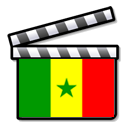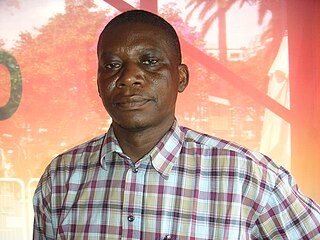Related Research Articles

Carthage Film Festival is an annual film festival that takes place in Tunis and was founded in 1966. It is also called by its abbreviation JCC, from its French name, Journées cinématographiques de Carthage, or by its Arabic title, أيام قرطاج السينمائية. Initially biennial alternating with the Carthage Theatre Festival, the festival became an annual event in 2014. A directing committee chaired by the Tunisian Ministry of Culture, joined with professionals of the cinema industry, is in charge of the organization.

Cinema of Africa covers both the history and present of the making or screening of films on the African continent, and also refers to the persons involved in this form of audiovisual culture. It dates back to the early 20th century, when film reels were the primary cinematic technology in use. As there are more than 50 countries with audiovisual traditions, there is no one single 'African cinema'. Both historically and culturally, there are major regional differences between North African and sub-Saharan cinemas, and between the cinemas of different countries.

Fanta Regina Nacro is well known for being the first woman from Burkina Faso to direct a feature film and is a founding member of the Guilde Africaine des Realisateurs et Producteurs. She is an artist who explores the themes of African cinema while tackling issues surrounding illness such as AIDS, and education for the girl child. She represents the "New African Wave". Nacro's films tend to question the traditions of Burkina Faso, while looking at the relationship between tradition and modernity in today's world.
The Cinema of Niger began in the 1940s with the ethnographical documentary of French director Jean Rouch, before growing to become one of the most active national film cultures in Francophone Africa in the 1960s-70s with the work of filmmakers such as Oumarou Ganda, Moustapha Alassane and Gatta Abdourahamne. The industry has slowed somewhat since the 1980s, though films continue to be made in the country, with notable directors of recent decades including Mahamane Bakabe, Inoussa Ousseini, Mariama Hima, Moustapha Diop and Rahmatou Keïta. Unlike neighbouring Nigeria, with its thriving Hausa and English-language film industries, most Nigerien films are made in French with Francophone countries as their major market, whilst action and light entertainment films from Nigeria or dubbed western films fill most Nigerien theatres.

The cinema of Senegal is a relatively small film industry which experienced its prime from the 1960s through to the early 1980s, but has since declined to less than five feature films produced in the last ten years. Senegal is the capital of African cinema and the most important place of African film production after its independence from France in 1960.
Flora Gomes is a Bissau-Guinean film director. He was born in Cadique, Guinea-Bissau on 31 December 1949 and after high school in Cuba, he decided to study film at the Instituto Cubano del Arte y la Industria Cinematográficos in Havana.

Djo Tunda Wa Munga also known as Djo Munga, is a Congolese film director and producer. He is best known for his award-winning 2010 thriller Viva Riva!, the first feature film to be produced in the Democratic Republic of the Congo in over 28 years.
La Vie est belle / Life is Rosy is a 1987 musical comedy directed by Mwezé Ngangura and Benoît Lamy. The film revolves around the vibrant music scene of Kinshasa and tells the rags-to-riches story of a poor rural musician played by legendary Congolese musician, Papa Wemba, the “King of Rumba Rock”, who seeks fame in the big city. The film was considered a major turning point in film production in the DRC with its more artistic approach. Unlike many African films of the time that concerned themselves with the effects of colonialism, La vie est belle celebrates Congolese culture, music and the lives of Kinshasans. The film score features Congolese music from artists Tshala Muana, Klody, and Zaiko Langa Langa, a Congolese soukous band co-founded by Papa Wemba.
The Draughtsmen Clash is a 1996 film directed by Balufu Bakupa-Kanyinda of the Democratic Republic of the Congo.
We Too Walked on the Moon is a 2009 Algerian film directed by Balufu Bakupa-Kanyinda.
Guy Bomanyama-Zandu is a filmmaker from the DRC.
Cinema of the Democratic Republic of the Congo originated with educational and propaganda films during the colonial era of the Belgian Congo. Development of a local film industry after the Democratic Republic of the Congo gained its independence from Belgium in 1960, and was handicapped by constant civil war.

Ahmed El Maanouni is a Moroccan screenwriter, film director, cinematographer, actor and producer. His films include Alyam Alyam (1978), the first Moroccan film to be selected in Cannes Film Festival and winner of the Grand Prize at the Mannheim Film Festival. He caught international attention when his film Trances was honored and presented by Martin Scorsese at the 2007 Cannes Film Festival to inaugurate the World Cinema Foundation. His film Les Coeurs brûlés (2007) won the Grand Prize at the National Film Festival and was awarded many international prizes. His documentary films consistently interrogate colonial history and its impact on Moroccan memory. He directs study groups and educational programs in Morocco and throughout the world. In 2007, he was honored with the title of Officier of the Ordre des Arts et des Lettres in France.
The International Film Festival and Forum on Human Rights (FIFDH) is one of the most important international events dedicated to cinema and human rights, held annually in Geneva. A ten-days long event is based on the concept ‘A film, A subject, A debate’, following the screenings with discussion in presence of filmmakers and specialists.
Kiripi Katembo, also known as Kiripi Katembo Siku, was a Congolese photographer, documentary filmmaker and painter. Katembo's short films, photography and other projects focused on the daily lives of the people of Kinshasa, as well as the economic and social challenges facing the Democratic Republic of the Congo. He was also a founding director of Mutotu Productions, his film production company, and the executive director of Yango Biennale, based in Kinshasa.
N'Diagne Adechoubou is a Beninese film director and producer.

Jean-Michel Kibushi Ndjate Wooto, is a Congolese stop-motion animator. He is the pioneer of African animation, and widely considered to be the first Congolese animator.
Général, nous voilà! is a 1997 documentary film directed by Ali Essafi in his directorial debut. It won a Grand Jury Award at the Festival International du Film Francophone de Namur. It was shown at the Carthage Film Festival and at the Paris Biennale of Arab Cinema.
Maki’la depicts the rough life of street children in Kinshasa, the capital city of the Democratic Republic of Congo. It is notable as the directorial debut of Machérie Ekwa Bahango and for using the Congolese language Lingala on the silver screen. It premiered at the Berlinale 2018.
Dieudo Hamadi is a documentary filmmaker from the Democratic Republic of the Congo.
References
- 1 2 "The Nigger Who Dared Conquer The Sky". Extra City Kunsthal. Retrieved 18 March 2012.
- 1 2 3 4 "Congolese filmmaker Balufu Bakupa-Kanyinda Recovery of cinemas in Kinshasa". San Finna. 14 August 2011. Retrieved 18 February 2012.[ permanent dead link ]
- ↑ "BALUFU BAKUPA-KANYINDA". Mubi. Retrieved 18 March 2012.
- ↑ Colm McAuliffe (16 November 2015). "The death of cinema in Congo: how churches killed off cowboy films: As the country is left without a single film theatre, a new documentary explores the end of a once thriving movie culture". The Guardian. Retrieved 8 October 2018.